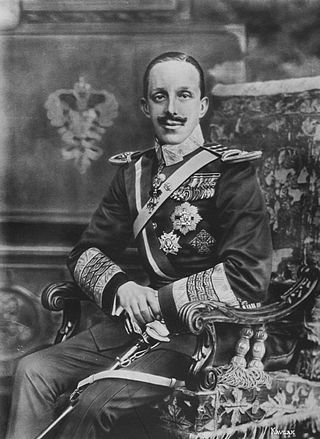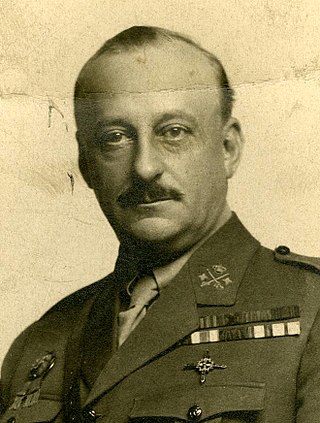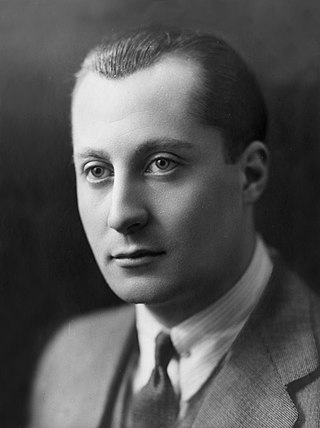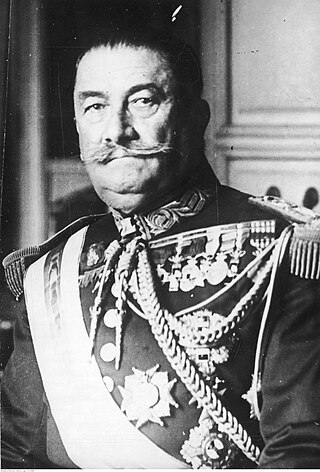| |||||
| Decades: | |||||
|---|---|---|---|---|---|
| See also: | Other events of 1923 List of years in Spain | ||||
Events in the year 1923 in Spain .
| |||||
| Decades: | |||||
|---|---|---|---|---|---|
| See also: | Other events of 1923 List of years in Spain | ||||
Events in the year 1923 in Spain .

Alfonso XIII, also known as El Africano or the African for his Africanist views, was King of Spain from his birth until 14 April 1931, when the Second Spanish Republic was proclaimed. He became a monarch at birth as his father, Alfonso XII, had died the previous year. Alfonso's mother, Maria Christina of Austria, served as regent until he assumed full powers on his sixteenth birthday in 1902.

José Miguel González Martín del Campo, known as Míchel, is a Spanish former professional footballer who played as a right midfielder, currently manager of Saudi Pro League club Al-Qadsiah.

Miguel Primo de Rivera y Orbaneja, 2nd Marquis of Estella, GE, was a Spanish dictator and military officer who ruled as prime minister of Spain from 1923 to 1930 during the last years of the Bourbon Restoration.

José Antonio Primo de Rivera y Sáenz de Heredia, 1st Duke of Primo de Rivera, 3rd Marquess of Estella GE, often referred to simply as José Antonio, was a Spanish fascist politician who founded the Falange Española, later Falange Española de las JONS.

Antonio Maura Montaner was Prime Minister of Spain on five separate occasions.

The Patriotic Union was the political party created by Spanish dictator Miguel Primo de Rivera, conceived as a support to his regime and integrating political Catholicism, technocrats, and the business-owning classes. The party's power was dependent upon the power of its founder and leader, not any popular mandate. Following the dismissal of Miguel Primo de Rivera in January 1930 by King Alfonso XIII, the party was succeeded by the National Monarchist Union.

Dámaso Berenguer y Fusté, 1st Count of Xauen was a Spanish general and politician. He served as Prime Minister during the last thirteen months of the reign of Alfonso XIII.
Miguel Ángel González Suárez, known as Miguel Ángel, was a Spanish professional footballer who played as a goalkeeper.

Álvaro de Figueroa y Torres, 1st Count of Romanones was a Spanish politician and businessman. He served as Prime Minister three times between 1912 and 1918, president of the Senate, president of the Congress of Deputies, Mayor of Madrid and many times as cabinet minister. He belonged to the Liberal Party. Romanones, who built an extensive political network, exerted a tight control on the political life of the province of Guadalajara during much of the Restoration period. He also was a prolific writer, authoring a number of history essays.
The Liberal Party, originally called Liberal Fusionist Party until 1885, was a Spanish political party created in 1880 by Práxedes Mateo Sagasta. With the Conservative Party of Antonio Cánovas del Castillo, it formed a two-party system of alternating governments, the turno, which characterised the Spanish Restoration during the late 19th century and the early 20th century.
The Liberal Conservative Party, also known more simply as the Conservative Party, was a Spanish political party founded in 1876 by Antonio Cánovas del Castillo.

Real Club Celta de Vigo, commonly known as Celta Vigo, is a Spanish professional football club based in Vigo, Galicia, that competes in La Liga, the top tier of Spanish football. Nicknamed Os Celestes, the club was founded in August 1923 as Club Celta, following the merger of Real Vigo Sporting and Real Fortuna. The club's home stadium is Balaídos, which seats 24,870 spectators.

The 1923 Spanish general election was held on Sunday, 29 April and on Sunday, 13 May 1923, to elect the 19th Cortes of the Kingdom of Spain in the Restoration period. All 409 seats in the Congress of Deputies were up for election, as well as 180 of 360 seats in the Senate.

The symbols of Francoism were iconic references to identify the Francoist State in Spain between 1936 and 1975. They serve as visual illustrations for the ideology of Francoist Spain. Uniforms were designed for men and women that combined elements of the earlier Falangist and Carlist uniforms. The state developed new flags and escutcheons based on the traditional heraldry of the monarchy, but now associated with the state. The emblem of five arrows joined by a yoke was also adopted from earlier Spanish symbology, but after 1945 the arrows always pointed upward. This emblem appeared on buildings, plaques and uniforms.
Miguel Rivera Mora is a Spanish football manager, who is currently in charge of Real Balompédica Linense.
The Maurist Party, initially known as the Maurist Conservatives or simply the Maurists, was originally a political faction within the Liberal Conservative Party, led by Antonio Maura, which split from the party in 1913 after Eduardo Dato's election as Conservative leader. A loose association of Maura's supporters at first, in 1918 it officially became a political party of its own.
The Liberal Democratic Party, also known as the Liberal Democrats was a political party led by Manuel García Prieto which split from the Liberal Party in 1913, shortly after the assassination of Prime Minister José Canalejas. The Liberal Democrats eventually went on to become the dominant liberal faction in the later stages of Restoration Spain.
The Ciervists, also known as the Ciervist Conservatives, were a political faction within the Liberal Conservative Party, led by Juan de la Cierva y Peñafiel, which split from the party in 1914.
Events in the year 2020 in Spain.
The National Assembly sometimes also referred to in Spanish as Asamblea Nacional Consultiva was a corporative chamber in Spain created by the dictatorship of Primo de Rivera, charged with the task of drafting a new constitution. It was active from 1927 to 1929.